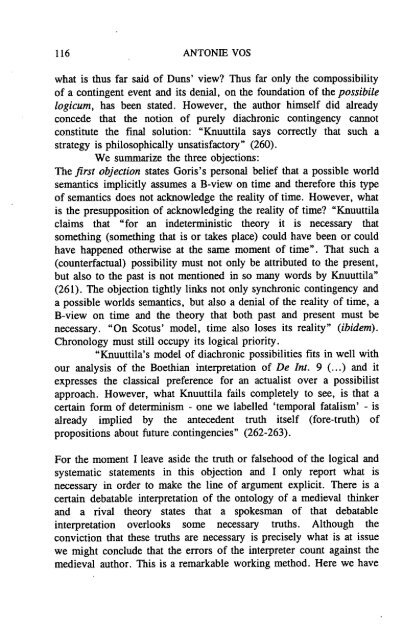Jaarboek Thomas Instituut 1997 - Thomas Instituut te Utrecht
Jaarboek Thomas Instituut 1997 - Thomas Instituut te Utrecht
Jaarboek Thomas Instituut 1997 - Thomas Instituut te Utrecht
You also want an ePaper? Increase the reach of your titles
YUMPU automatically turns print PDFs into web optimized ePapers that Google loves.
116 ANTONIE VOS<br />
what is thus far said of Duns' view? Thus far only the compossibility<br />
of a contingent event and its denial, on the foundation of the possibile<br />
logicum, has been sta<strong>te</strong>d. However, the author himself did already<br />
concede that the notion of purely diachronic contingency cannot<br />
constitu<strong>te</strong> the final solution: "Knuuttila says correctly that such a<br />
stra<strong>te</strong>gy is philosophically unsatisfactory" (260).<br />
We summarize the three objections:<br />
The first objection sta<strong>te</strong>s Goris's personal belief that a possible world<br />
semantics implicitly assumes a B-view on time and therefore this type<br />
of semantics does not acknowledge the reality of time. However, what<br />
is the presupposition of acknowledging the reality of time? "Knuuttila<br />
claims that "for an inde<strong>te</strong>rministic theory it is necessary that<br />
something (something that is or takes place) could have been or could<br />
have happened otherwise at the same moment of time". That such a<br />
(coun<strong>te</strong>rfactual) possibility must not only be attribu<strong>te</strong>d to the present,<br />
but also to the past is not mentioned in so many words by Knuuttila"<br />
(261). The objection tightly links not only synchronic contingency and<br />
a possible worlds semantics, but also a denial of the reality of time, a<br />
B-view on time and the theory that both past and present must be<br />
necessary. "On Scotus' model, time also loses its reality" (ibidem).<br />
Chronology must still occupy its logical priority.<br />
"Knuuttila's model of diachronic possibilities fits in well with<br />
our analysis of the Boethian in<strong>te</strong>rpretation of De Int. 9 (... ) and it<br />
expresses the classical preference for an actualist over apossibilist<br />
approach. However, what Knuuttila fails comple<strong>te</strong>ly to see, is that a<br />
certain form of de<strong>te</strong>rminism - one we labelled '<strong>te</strong>mporal fatalism' - is<br />
already implied by the an<strong>te</strong>cedent truth itself (fore-truth) of<br />
propositions about future contingencies" (262-263).<br />
For the moment I leave aside the truth or falsehood of the logical and<br />
sys<strong>te</strong>matic sta<strong>te</strong>ments in this objection and I only report what is<br />
necessary in order to make the line of argument explicit. There is a<br />
certain debatable in<strong>te</strong>rpretation of the ontology of a medieval thinker<br />
and a rival theory sta<strong>te</strong>s that a spokesman of that debatable<br />
in<strong>te</strong>rpretation overlooks some necessary truths. Although the<br />
conviction that these truths are necessary is precisely what is at issue<br />
we might conclude that the errors of the in<strong>te</strong>rpre<strong>te</strong>r count against the<br />
medieval author. This is a remarkable working method. Here we have








